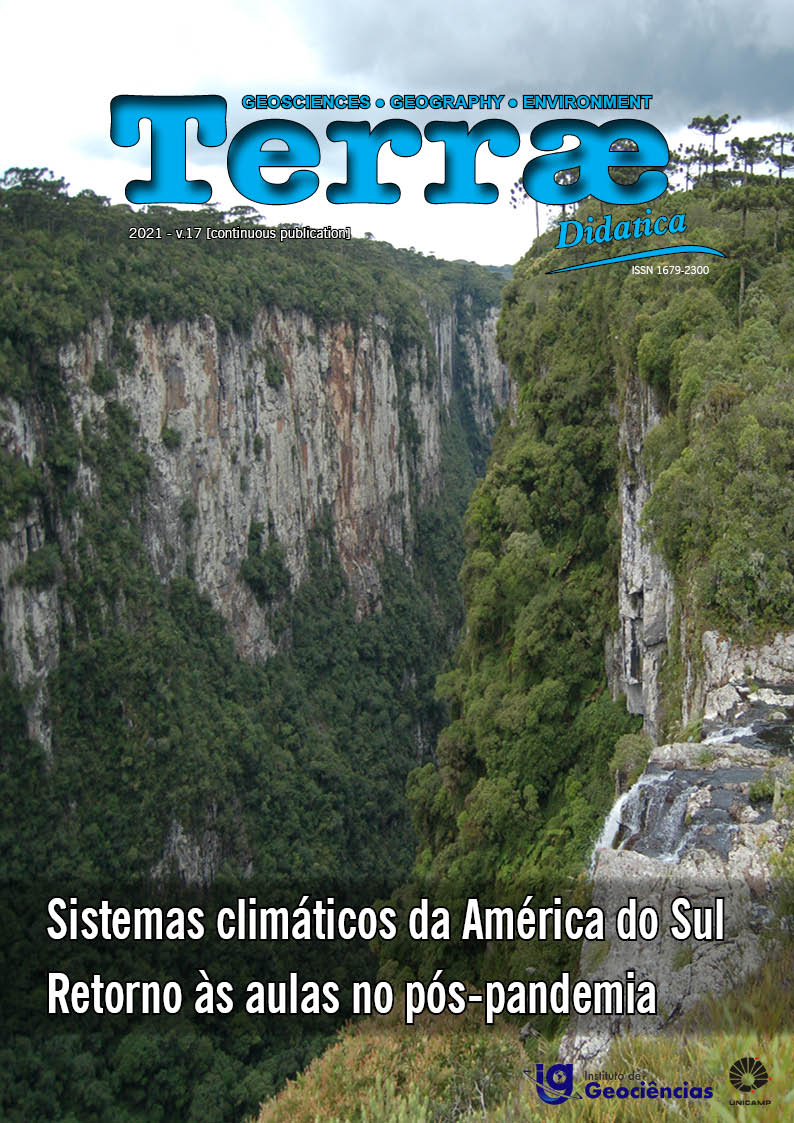Resumen
El desarrollo sostenible engloba un conjunto de problemas ambientales, sociales y económicos, y es urgente enseñar una ciudadanía responsable e informada. La visión holística del sistema terrestre en la educación científica mejora la percepción del papel del Hombre en los ecosistemas y promueve la consciencia ambiental esencial para el desarrollo sostenible. Este trabajo es un recurso didáctico para la discusión y reflexión guiada en la enseñanza de las Ciencias Naturales (8º año del 3º ciclo de Educación Básica) y Biología y Geología (10º año de Educación Secundaria), según el plan de estudios portugués. El enfoque innovador del sistema terrestre que se aleja de la perspectiva tradicional centrada en una interpretación reductiva del planeta. Se proponen preguntas y actividades, secuenciales e intencionadas, adecuadas al ámbito de la Sostenibilidad en la Tierra y en el capítulo I – “La Tierra y sus subsistemas interactuantes” y el capítulo III – “La Tierra, un planeta único a proteger”, definidos respectivamente en el plan de estudios nacional del octavo y décimo años de escolaridad.
Citas
Abrunhosa, M., Chambel, A., Peppoloni, S., & Chaminé, H. I. (2021). Advances in Geoethics and Groundwater Management: Theory and Practice for a Sustainable Development. In: Abrunhosa, M., Chambel, A., Peppoloni, S., & Chaminé, H. I. (Eds). (2021). Proceedings of the 1st Congress on Geoethics and Groundwater Management. Springer. p. 1-523. doi: 10.1007/978-3-030-59320-9.
Assaraf, O. B., & Orion, N. (2005). Development of system thinking skills in the context of Earth System Education. Journal of Research in Science Teaching, 42(5), 518-560. doi: 10.1002/tea.20061.
Barzagli, F., & Mani, F. (2019). The increased anthropogenic gas emissions in the atmosphere and the rising of the Earth’s temperature: are there actions to mitigate the global warming? Substantia, 3(1), 101-111. doi: 10.13128/Substantia-69.
Branco, E. A., Roquetti, D. R., & Moretto, E. M. (2017). O sistema terrestre (land system) como plataforma de integração e interpretação das complexas relações ambiente-sociedade. Sustentabilidade em Debate, 8(3), 111-125. doi: 10.18472/SustDeb.v8n3.2017.24518.
Batzri, O., Assaraf, O. B. Z., Cohen, C., & Orion, N. (2015). Understanding the Earth Systems: Expressions of Dynamic and Cyclic Thinking Among University Students. Journal of Science Education and Technology, 24(6), 761-775. doi: 10.1007/s10956-015-9562-8.
Dias, A. J. G., Freitas, M. C. A. O., Guedes, F., & Bastos, M. C. (2014). Geosfera. Rev. Ciência Elem., 2(1), 107. doi: 10.24927/rce2014.107.
Ellis, C. E. (2015). Ecology in an anthropogenic biosphere. Ecological Monographs, 85(3), 287-331. doi: 10.1890/14-2274.1.
European Space Agency (ESA). (2006). The Changing Earth: New Scientific Challenges for ESA`s Living Planet Programe. European Space Agency, ESA.
Frontier, S. (2001). Os Ecossistemas. Lisboa. Instituto Piaget.
Goodison, B., Brown, J., Jezek, K., Key, J., Prowse, T., Snorrason, A., & Worby, T. (2007). Presente y futuro de la criosfera polar, incluyendo la variabilidad del ciclo hidrológico ártico. Boletín de la OMM, 56(4), 284-292.
Hoffman, M., & Barstow, D. (2007). Revolutionizing Earth System Science Education for the 21st Century. Report and Recommendations from a 50-State Analysis of Earth Science Education Standards. Cambridge. TERC, Center for Earth and Space Science Education.
Intergovernmental Panel on Climate Change (IPCC). (2019). Summary for Policymakers. In: IPCC Special Report on the Ocean and Cryosphere in a Changing Climate [Potner, H. O., Roberts, D. C., Masson-Delmotte, V., Zhai, P., Tignor, M., Poloczanska, E., Mintenbeck, K., Nicolai, M., Okem, A., Petzold, J., Rama, B., & Weyer, N. (Eds.)]. (no prelo).
Latorre, M. L., Júnior, O. A. D. C, Carvalho, A. P. F. D., & Shimabukuro, Y. E. (2002). Correção atmosférica: conceitos e fundamentos. Espaç. Geogr., 5(1), 153-178.
Lévêque, C. (2002). Ecologia: do Ecossistema à Biosfera. Instituto Piaget. Lisboa.
Monteiro, A. F. M., Yamamoto, A. L. C., Silva, P. N., & Reboita, M. S. (2021). Conhecer a complexidade do sistema climático para entender as mudanças climáticas. Terræ Didatica, 17, 1-12. doi: 10.20396/td.vl7i00.8663763.
Moreira, C. (2015). Biosfera. Rev. Ciência Elem., 3(2),113. doi: 10.24927/rce2015.113.
Oliveira, M. J. C., Barbosa, R., Carneiro C. D. R., & Nobre, H. M. (2021). Comunicação pública da Ciência diante das coalizões em conflito sobre aquecimento global. Terræ Didatica, 17, 1-13. doi: 10.20396/td.v17i0.8663967.
Orion, N. (2007). A Holistic Approach for Science Education For All. Eurasia Journal of Mathematics, Science & Technology Education, 3(2), 99-106. doi: 10.12973/ejmste/75382.
Orion, N. (2019). The future challenge of Earth science education research. Disciplinary and Interdisciplinary Science Education Research,1(3), 1-8. doi: 10.1186/s43031-019-0003-z.
Ribeiro, T., Cardoso, A., Silva, J., Lima, D., & Vasconcelos, C. (2021). Chamadas de Geoética: Um Módulo Interativo para Comunicar Geociências. In: Abrunhosa, M., Chambel, A., Peppoloni, S., & Chaminé, H. I. (Eds.). (2021). Advances in Geoethics and Groundwater Management: Theory and Practice for a Sustainable Development. Springer. p. 363-366.
Silveira, L. M. da, & Petrini, M. (2018). Desenvolvimento Sustentável e Responsabilidade Social Corporativa: uma análise bibliométrica da produção científica internacional. Gestão & Produção, 25(1), 56-67. doi: 10.1590/0104-530x3173-16
Sterling, S. (2010). Living in the Earth: Towards an Education for Our Tim. Journal of Education for Sustainable Development, 4 (2), 213-218. doi: 10.1177/097340821000400208.
Stroeve, J. C., Kattsov, V., Barrett, A., Serreze, M., Pavlova, T., Holland, M. & Meier, W. N. (2012). Trends in Arctic sea ice extent from CMIP5, CMIP3 and observations. Geophysical Research Letters, 39 (16). doi: 10.1029/2012gl052676.
Summons, R. E. (1993). Biogeochemical cycles. In: Engel, M. H., & Macko, S. A. (Eds.), Organic Geochemistry (pp. 3-21). Springer.
Tundisi, J. G. (2003). Ciclo hidrológico e gerenciamento integrado. Cien. Cult., 55 (4), 31-33.
UNenvironmentprograme (2020). Coronavirus outbreak highlights need to address threats to ecosystems and wildlife. United Nations. UNEP. URL: https://www.unep.org/news-and-stories/story/coronavirus-outbreak-highlights-need-address-threats-ecosystems-and-wildlife Acesso 3.03.2021
United Nations. (1987). Report of the Word Commission on Environnment and Development: Our Common Future. United Nations.
Vasconcelos, C., & Orion, N. (2021). The Earth sciences education as a key component of the education for sustainability. Sustainability, 13(3), 1316. doi: 10.3390/su13031316.
Wohlleben, P. A. (2019). Sabedoria Secreta da Natureza. Lisboa. Ed. Pergaminho.

Esta obra está bajo una licencia internacional Creative Commons Atribución-NoComercial 4.0.
Derechos de autor 2021 Terrae Didatica


